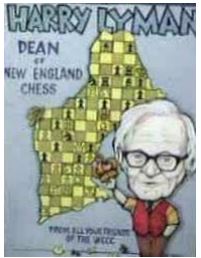 June 15th, 2015 marks what would be the 100th birthday of Harry Lyman, an unforgettable force in the development of New England chess for much of the 20th century. To commemorate the anniversary, we now present a collection of four essays from prominent figures in New England chess on the legendary figure. June 15th, 2015 marks what would be the 100th birthday of Harry Lyman, an unforgettable force in the development of New England chess for much of the 20th century. To commemorate the anniversary, we now present a collection of four essays from prominent figures in New England chess on the legendary figure.
Harry Lyman, Teacher
Mike Griffin
Originally published in the Boylston Chess Club blog
In the late 60's I was a high school kid, informally coached by my great Uncle Justin "Ducky" Power (long time member of the BCC) and I stumbled into the YMCU to be taken by the enthusiasm and encouragement of Harry.
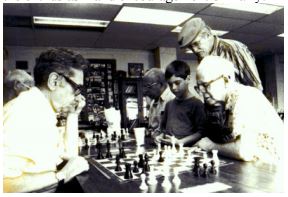 I realize looking back it was Harry that could answer my questions and feed my curiosity that made chess the most attractive game to me. At that time I was studying Backgammon and Go with my brother Jay Griffin.
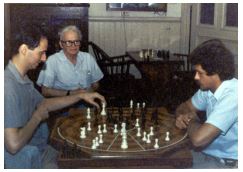 From Harry I learned: to be a chess player was to be part of a society that was older than a millennium; chess could become an individual's vision quest/avocation in/for life; where your individual contributions in turn benefit the collective whole; chess was a metaphor for how a person should deal with living.
A few Harry Lyman stories:
Harry was a very strong checkers player and would beat all comers. Occasionally a real old timer checker player would come by to the YMCU and challenge Harry. I believe most of the checkers/draughts records on acid paper rotted to nothing in the back rooms at Clarendon Street. By the way, many of the YMCU members played all types of games and were quite good at non-chess, as we well know. This multi game legacy comes from Harry Nelson Pillsbury.
Professor Harry Lyman taught a course of endgames at the Bunker Hill Community College in the 70's based on Keres' Practical Chess Endings - attended by MG. In the recession of the late 70's, when the club was full of people unable to find work having time on their hands: Harry proclaimed what the BCC needed was a "club defense" against d4 and created a committee to find it for the BCC. They created a list of requirements and went out and searched. Harry would hold various meetings and the committee found that the Benoni was the best defense for BCC members against d4. They worked and found many special variations to trip up white. All in great fun. To this day, when I see some long time BCF member playing the Benoni I wonder if they were initially influenced by output of Harry's Benoni committee.
Harry and medical science: It's the early 70's one hot summer Tuesday as I walked from Park Street station to the BCC. An hour before noon I noticed the bank across the street posted 101 degrees. There were very few people at the BCC and despite fans blowing the heat was oppressive, there was no real relief. Harry sat quietly to himself, an ashen gray, clearly in a great deal of pain, as he was suffering an angina attack. We wanted to call an ambulance but Harry refused saying would be alright in a few minutes. Harry slowly got better, but given my experience with family members' heart conditions I felt Harry was not in a good way. Yet Harry survived almost 30 more years battling chronic ailments; and chess in the Boston could benefit immensely from those three additional decades beyond 1970.Harry gave everything that he could to the game, and his influence will ripple throughout many generations to come. Thank You Harry.
Harry Lyman, Giver
Bernardo Iglesias
I remember Harry Lyman as a very generous man, well educated, presentable and witty to talk on any subject but, especially chess.
In November 1972 after joining for the first time the Boylston Chess Club at the original site in downtown Boston, 44 Boylston Street at the highest level of chess History in the USA: the Fischer era, I started playing chess and became a tournament director at the BCC.
Around 1975, Harry called me one day and he proposed to pay my BCC membership dues (chess club and social membership for YMCU), I refused his offer because I told him I was working and I could afford it. I knew he used to help many people with low income in becoming members of the BCC. He offered me many things in years after that including: MACA memberships, USCF memberships, books, chess sets but, I always refused his generosity with the same answer - “No, thanks Harry, I can pay for it”. I became president of the BCC for two straight years to his delight of my leadership, offering more weekends chess tournaments, compared before only to TNS (Thursday Night Swiss) and one or two weekend chess per month; sending letters to the members for the Annual meeting in October and regular quarterly meetings for the board. Tuesday was a very popular day; it was the club’s Open House. Because he was there all day welcoming new people, his friends used to drop by to talk to him and he used to teach chess to anyone wanting to learn chess, after 7pm there was a blitz event.
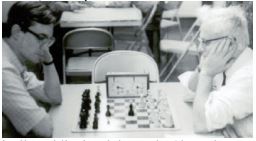 Finally, while the club was in Clarendon Street, one Tuesday evening at the club, he had two chess books in his hands, ECO, volumes D and E; he said to me could you hold these two books browse them and bring them next week, I said yes to him, took the books home, I checked some of my repertoire openings with D & E. That was the last time I saw him alive, he got sick and did not come to the club for weeks until I learned that he passed away.
I decided to keep those two volumes for me as a gesture that he will have liked to keep them. I still have in my home library shelves those two books.
Harry Lyman, Friend
Harold Dondis
In a bygone era it was the habit of the Globe Chess column to designate as Saints those persons who promoted chess in the New England area. Harry Lyman of Saugus was one of those crowned, but he probably should have been identified as Chief Saint. Harry's picture adorns the walls of the Boylston Club; always a chess enthusiast, he dedicated his later years to education of novices and the art and love of chess.
Your author first met Harry Lyman by chance. On a date with a young lady, I went to a modern poetry group in Dorchester, a member of which was Jim Burgess, chess columnist of the Globe. He got me interested in tournament chess, a game I had learned at Boy’s camp at the age of ten, but had never played in chess tournaments. The introduction was accomplished by bringing me into the Boylston Club in Boston and introducing me to Harry Lyman. Harry Lyman virtually embraced any body he met, exuding a warmth and good will especially if they were interested in chess. Harry had previously collaborated with Burgess in writing the Globe column.
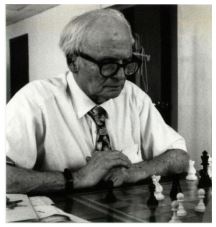 I knew very little of Harry’s background except that he had retired from the Quartermaster Corps. He had worked in Rhode Island and then as I recall briefly at the Custom House in Boston. He was a good friend of Weaver Adams, the outstanding player of New England Chess. Weaver religiously believed that the Vienna Opening was a forced win for White. I am writing from memory now. Harry agreed to test Weaver’s sweeping hypothesis and the two of them embarked on a correspondence duel that I believe lasted well over 170 games—I do not remember the exact number. Harry came out with a majority of the wins, but Weaver insisted that his theory was supported by their experiment.
In any event I soon learned that Harry was present every Tuesday to teach chess to all comers at Boylston. He was also present on Thursdays to watch over battles in the Metropolitan Chess League. His interest in teaching was phenomenal, making even beginners, who had won games, convinced that they had played with extraordinary insight. In fact Harry loved to go over those games. In his own games Harry was discontented if he could not sacrifice a pawn, because he could not get the counterplay that was so dear to him. Of course he knew his openings well, especially Kingside openings. I would not have an inventory of those whom he developed as players, but it would be a vast number, including some who eventually outplayed Harry and became chess Senior Masters. I recall that John Curdo and Harry waged a match, and I understand that Harry won it, though John had a long range plus in their encounters.
Whenever I got an inquiry of a parent whose child was interested in learning more of the game, I told him or her to go to Boylston on Tuesday and ask for Harry Lyman. He was a fine player as well as an enthusiastic promoter of the game, after all - as I recall, Harry shared first place in the U.S. Amateur championship one year, showing me a game in which he disoriented an opponent by banging down a move. Harry had taught his nephew Shelby the game, who apparently over the objection of family, started to pursue a chess career. Shelby found his profession when he became the star of the TV program on the Fischer Spassky match.
One other point about Harry’s Sainthood is that his purse was open for the Boylston Club and even for players who were short on entry fees. He also financed two player matches. As Boylston was being subjected to higher rentals, Harry stepped forward to cover the shortage, and only wise counselors were able to convince Harry that the landlord’s demands could not reasonably be met.
It now comes back to me that Harry and I combined to teach a class at the Charlestown Bunker Hill Community College. I was interested in the field of problem solving and Harry was interested in chess and another mental system that now escapes me. Harry arranged for most of the students, largely chess players, to enroll in the course. We had about ten students, including one from MIT who was able to get credit there for attending our class, because it was a unique course dealing with mental ability. Unfortunately, the class only lasted one year, as I could not find the time to practice law and teach at the same time. I do regret, however, that we did not continue the course, as I believe it would have been increasingly popular.
Harry Lyman, Gambiteer
Steve Stepak
Originally published in the Boylston Chess Club blog
Harry Lyman helped me in my time of need. No surprise, he helped many a chess player on the edge. He was there to listen. His advice was sussinct. He offered money to help, if needed. If you came to a tournament he would notice you, ask you if you are playing; if not why. Then he would offer to pay the entry fee for you to play, no more questions asked. He was a pioneer in the field of Chess and Education and led the Boylston Chess Club to sponsor women's futurities (round robins to offer FIDE titles).
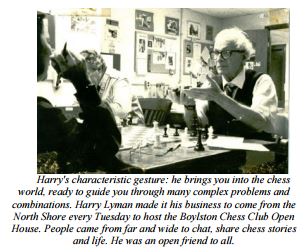 But Harry was also a notable player in his own right, remarkable for his adventurous, gambiteering style. Harry Lyman won the New England Open on several occasions. His rating at that time was estimated to be 2340. In 1957, Harry won the US Amateur Championship in Ashbury Park, NJ, with a perfect 6-0. The following is one of Harry’s signature chess adventures, against another local legend:
Harry Lyman
Harlow Daly
Boston
1941
Dutch [A90]
|